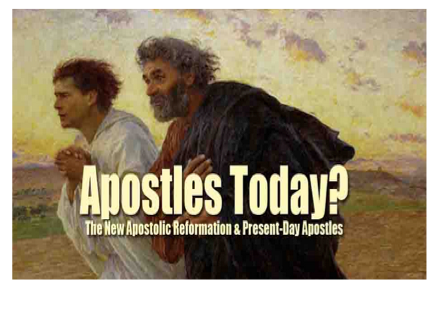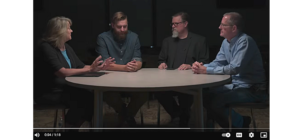If you’re looking for a simple definition of the New Apostolic Reformation (NAR), I’ve come up with this:
The NAR is a fast-growing Dominionist movement of new Apostles and Prophets who will lead God’s end-times army in establishing His kingdom on earth, by taking authority over earthly and spiritual realms.
Proponents of the NAR believe that the governing offices of Apostle and Prophet have been re-established by God. There are nuances within this movement of course, and you’ll want to check out our New Apostolic Reformation White Paper for further study.
Recently, author Elliott Nesch completed a four-part series titled, Apostles Today, in which he explains the Scriptural qualifications for these offices, and why it is impossible for Apostles to govern Christian churches in our time:
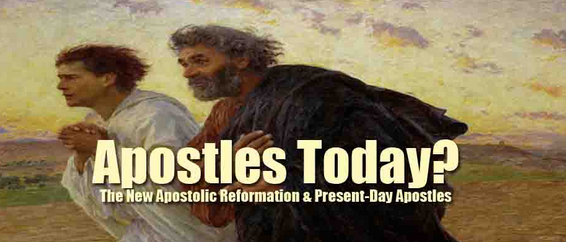
By Elliott Nesch
In his article, “Understanding How Apostles Minister in Different Spheres,” the late modern Apostle C. Peter Wagner defines an apostles as a “Christian leader gifted, taught, commissioned, and sent by God with the authority to establish the foundational government of the church within an assigned sphere of ministry by hearing what the Spirit is saying to the churches and by setting things in order accordingly for the growth and maturity of the church.” Based upon the text of Ephesians 4:11, Wagner argues for what he calls the foundational or governmental gift or office of apostle. This is the teaching of the teaching of the apostolic and prophetic movement, sometimes known as the New Apostolic Reformation (NAR). But what does the Bible say about apostles today?
Biblical Definition of Apostle
The Greek noun apostolos, from which we get the word “apostle,” means “a delegate, messenger, one sent forth with orders.” Apostolos is derived from the verb apostellō, which means “to send off, to send away; to order (one) to go to a place appointed.” In other words, an apostle is an emissary or one who is sent. In the KJV the word apostolos is translated “apostles” (78x), “messenger(s)” (2 Corinthians 8:23; Philippians 2:25) and “he that is sent” (John 13:16). Jesus Christ was an “Apostle” sent from the Father (Hebrews 3:1-2). In a similar way, the Twelve are Christ’s apostles. Jesus said to His apostles, “Peace be unto you: as my Father hath sent me, even so send I you” (John 20:21).
In the New Testament, an apostle was one who was sent to preach the gospel. Several individuals in the church were called apostles. Other than the Twelve and Paul, those apostles/messengers were James, the Lord’s brother (1 Corinthians 15:7; Galatians 1:19) Barnabas (Acts 14:4-14), Epaphroditus (Philippians 2:25), Silvanus and Timothy (1 Thessalonian 2:6; cf. 1 Thessalonians 1:1). 1 Corinthians 15:3-8 may also indicate that there were other apostles in addition to the Twelve and Paul. All of these apostles are what 2 Corinthians 8:23 calls “messengers [apostles] of the churches.” They all bore the title, though they were not among the foundational apostles chosen by our Lord to govern the church. Therefore, we must make a major distinction between those in the New Testament who were apostles of Christ and the apostles of the churches.
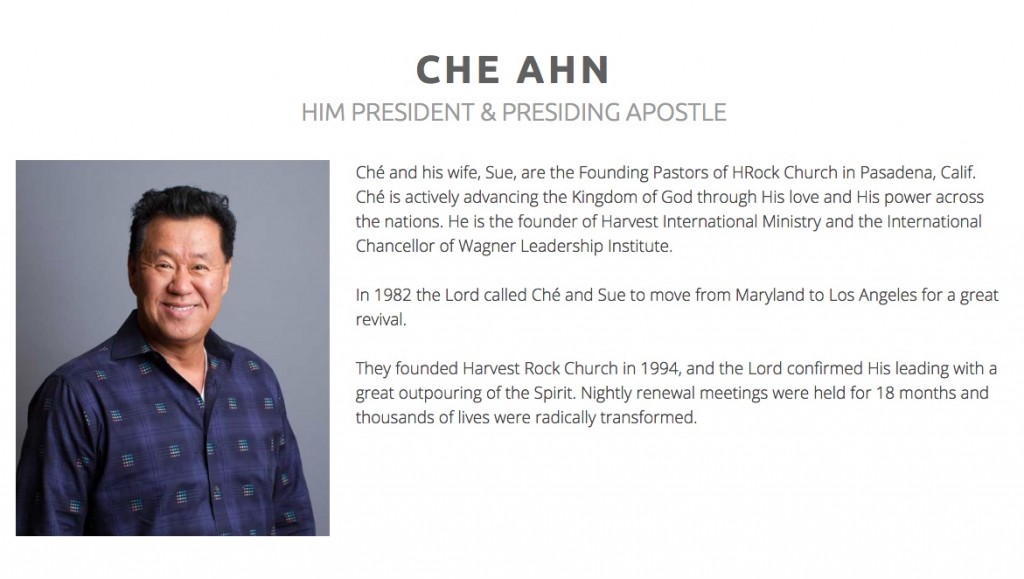 In a very broad sense, apostolic work may be likened to missionary work, that is, when Christians are sent by the church as church-planting evangelists. But that’s not what NAR leaders have in mind when they claim to wield the authority of an apostolic office. Instead, today’s apostles are claiming authority and power that belonged uniquely to men specifically chosen by the Lord. One example is the modern Apostle Che Ahn who is founder of Harvest International Ministry (HIM) and the International Chancellor of Wagner Leadership Institute (WLI). Under Che Ahn’s apostolic authority, WLI has “spread into numerous regional schools throughout the U.S. and into 11 nations.” As the Presiding Apostle of HIM, Che Ahn oversees “more than 25,000 ministries and organizations in 65 nations.”
In a very broad sense, apostolic work may be likened to missionary work, that is, when Christians are sent by the church as church-planting evangelists. But that’s not what NAR leaders have in mind when they claim to wield the authority of an apostolic office. Instead, today’s apostles are claiming authority and power that belonged uniquely to men specifically chosen by the Lord. One example is the modern Apostle Che Ahn who is founder of Harvest International Ministry (HIM) and the International Chancellor of Wagner Leadership Institute (WLI). Under Che Ahn’s apostolic authority, WLI has “spread into numerous regional schools throughout the U.S. and into 11 nations.” As the Presiding Apostle of HIM, Che Ahn oversees “more than 25,000 ministries and organizations in 65 nations.”
In its more restricted and common New Testament usage, apostle specifically refers to the twelve apostles (with the addition of Matthias after Judas’s defection), and the apostle Paul. In contrast to the apostles of the churches, these men were appointed and sent by the Lord Himself. The name apostle was specified by Christ: “He named them Apostles” (Luke 6:13). According to Matthew 16:18, Ephesians 2:20 and Revelation 21:14, it is these apostles upon whom the church is built.
Paul the apostle was not among the Twelve, yet he is recognized as a unique apostle to the Gentiles. In his own words, he was “called to be an apostle” (Romans 1:1; 1 Corinthians 1:1); “an apostle of Jesus Christ” (2 Corinthians 1:1; Titus 1:1); “one born out of due time” (1 Corinthians 15:8); “an apostle (not from men nor through man, but through Jesus Christ and God the Father who raised Him from the dead)” (Galatians 1:1); “an apostle of Jesus Christ by the will of God” (Ephesians 1:1; Colossians 1:1; 2 Timothy 1:1); “an apostle of Jesus Christ, by the commandment of God our Savior and the Lord Jesus Christ” (1 Timothy 1:1).
The Credentials of an Apostle
At least three credentials may be observed for New Testament apostles:
(1) The apostles were personally chosen by the Lord Jesus Christ.
In the gospel, we read: “And he ordained twelve, that they should be with him, and that he might send them forth to preach” (Mark 3:14); “And when it was day, he called unto him his disciples: and of them he chose twelve, whom also he named apostles” (Luke 6:13). The Lord also said to the apostles, “Ye have not chosen me, but I have chosen you, and ordained you, that ye should go and bring forth fruit” (John 15:16). In his preface to the book of Acts, Luke wrote, “after He [Jesus] through the Holy Spirit had given commandments to the apostles whom He had chosen” (Acts 1:2).
The necessity of appointment by Christ is also emphasized when Judas Iscariot was replaced. First, two men were selected who met the necessary prerequisites for an apostle of Christ. Because the apostle had to be personally chosen by the Lord, they prayed and cast lots:
And they prayed, and said, Thou, Lord, which knowest the hearts of all men, shew whether of these two thou hast chosen, That he may take part of this ministry and apostleship, from which Judas by transgression fell, that he might go to his own place. And they gave forth their lots; and the lot fell upon Matthias; and he was numbered with the eleven apostles” (Acts 1:24-26).
Speaking to the household of Cornelius, the apostle Peter said, “Him God raised up the third day, and shewed him openly; Not to all the people, but unto witnesses chosen before God, even to us, who did eat and drink with him after he rose from the dead” (Acts 10:40-41).
Paul also recognized the Lord as the source of his apostolic office: “By whom we have received grace and apostleship, for obedience to the faith among all nations, for his name” (Romans 1:5). The Lord said of Paul, “he is a chosen vessel unto me, to bear my name before the Gentiles, and kings, and the children of Israel” (Acts 9:15). Ananias declared to Paul, “The God of our fathers hath chosen thee, that thou shouldest know his will, and see that Just One, and shouldest hear the voice of his mouth. For thou shalt be his witness unto all men of what thou hast seen and heard” (Acts 22:14-15). Describing his apostolic work, Paul spoke of “the ministry, which I have received of the Lord Jesus, to testify the gospel of the grace of God” (Acts 20:24). Paul spent much of 2 Corinthians defending his apostleship by comparison of his own ministry to the false apostles. He opened the letter by saying, “Paul, an apostle of Jesus Christ by the will of God” (2 Corinthians 1:1). He echoed that specific calling in 1 Corinthians 1:1, Galatians 1:1, Ephesians 1:1, Colossians 1:1, 1 Timothy 1:1 and Titus 1:1.
Within NAR organizations like the International Coalition of Apostolic Leaders (ICAL), there is an application process and annual membership fee. The annual membership fees for ICAL are provided on their website (accessed 2/12/18):
- United States based member: $450.00
- Married apostles combined : $650.00
- First Nation (American Indian): $350.00
- International independent members (those not belonging to their individual country’s Coalition): $350.00 (USD)
- International married apostles combined: $450.00.
- Fees may be paid in two installments by check, credit card or at the Online Store.
If you are interested in ICAL membership, please fill out the Information Form below. You will be asked to provide the names of two ICAL Members you know who might nominate you. If you do not know any present members, please continue the application process and an ICAL representative will contact you regarding your request.
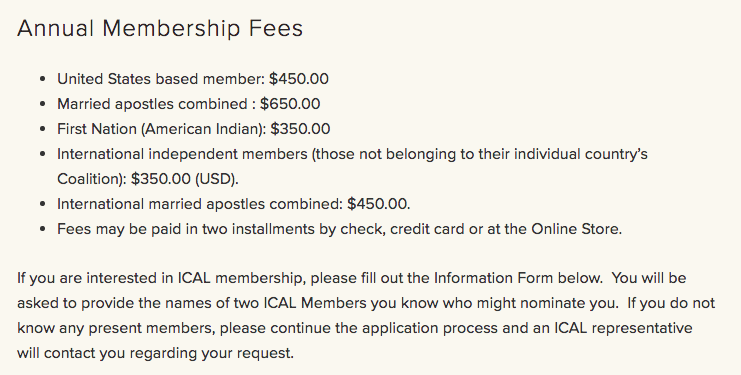
In other words, the modern apostles are self-appointed. A person can’t simply appoint himself a police officer, a doctor, or a senator just because he likes the title. And they definitely can’t assume any legitimate authority and power by such self-appointment to those roles. Unlike the apostles of Jesus Christ who were personally chosen by Him, the modern so-called apostles are self-appointed.
(2) The apostles were personal eye-witnesses of the risen Lord Jesus Christ.
These qualifications for the apostles are given in Acts 1 when an apostle was being selected to replace Judas Iscariot, the traitor who hanged himself. Simon Peter addressed the disciples and said that Psalm 69:25 predicted Judas’ defection and Psalm 109:8 predicted that his place among the apostles should be filled. The apostle Peter declared,
Wherefore of these men which have companied with us all the time that the Lord Jesus went in and out among us, Beginning from the baptism of John, unto that same day that he was taken up from us, must one be ordained to be a witness with us of his resurrection (Acts 1:21-22).
According to Peter, the candidate to fill the apostolic office needed to have personally sat under the teaching of Jesus and known the Lord after His resurrection. Two candidates fulfilled those qualifications: “And they appointed two, Joseph called Barsabas, who was surnamed Justus, and Matthias” (Acts 1:23).
The apostle Peter reiterated this important credential in his preaching:
God anointed Jesus of Nazareth with the Holy Ghost and with power: who went about doing good, and healing all that were oppressed of the devil; for God was with him. And we are witnesses of all things which he did both in the land of the Jews, and in Jerusalem; whom they slew and hanged on a tree: Him God raised up the third day, and shewed him openly; Not to all the people, but unto witnesses chosen before God, even to us, who did eat and drink with him after he rose from the dead” (Acts 10:38-41).
The apostle Peter also wrote, “For we have not followed cunningly devised fables, when we made known unto you the power and coming of our Lord Jesus Christ, but were eyewitnesses of his majesty” (2 Peter 1:16). Likewise, the apostle John declared, “That which was from the beginning, which we have heard, which we have seen with our eyes, which we have looked upon, and our hands have handled, of the Word of life; . . . That which we have seen and heard declare we unto you” (1 John 1:1-3).
The apostles learned the gospel from the Lord Jesus Christ, not other men, and Paul was no exception. Paul said, “But I certify you, brethren, that the gospel which was preached of me is not after man. For I neither received it of man, neither was I taught it, but by the revelation of Jesus Christ” (Galatians 1:11-12). Although the apostle Paul did not bear witness to the Lord’s earthly ministry like the other apostles, he was no less a witness of the risen Christ. The apostle Paul laid claim to his apostolic office when he asked the rhetorical question: “Am I am not an apostle? am I not free? have I not seen Jesus Christ our Lord?” (1 Corinthians 9:1). Moreover, Paul wrote,
And that he was seen of Cephas, then of the twelve: After that, he was seen of above five hundred brethren at once; of whom the greater part remain unto this present, but some are fallen asleep. After that, he was seen of James; then of all the apostles. And last of all he was seen of me also, as of one born out of due time” (1 Corinthians 15:5-8).
In other words, Paul was claiming the same type of appearance of Christ to himself that the original apostles received.
What about modern apostles? In 2009, the “apostolic father” Brian Simmons claims that Jesus Christ came into his room, breathed on him, and commissioned him. According to Simmons, Jesus said to him, “I’m commissioning you to translate the Bible into the translation project that I’m giving you to do.” He believes that an impartation of revelation was given to him in order to translate the Bible (The Passion Translation). Simmons claims to receive divine “downloads” and a new translation of Ephesians 5:22. He makes a distinction between himself and writers of Scripture, yet he claims he was translated into the library of heaven where he saw more books than you can imagine. One book stood out called John 22. Simmons claims, “I believe the John 22 generation will be a people that do the greater works of Jesus. They will not add to the scripture, and that’s a sealed book. But it is a book that is unfolding and the works of Jesus will be replicated by an entire generation of people that believe fully in the power of God.” He claims to not be adding to the Scripture, yet he acts as an inspired apostle with the authority to receive a new translation and a new chapter of the Bible. See his interview on Sid’s Roth It’s Supernatural. The claims of Simmons are absolutely ridiculous, to say the least. And such an appearance doesn’t compare to the first-century apostles who were personal eye-witnesses to the Lord.
The resurrection of Christ was a primary theme of apostolic preaching (cf. Acts 2:24; Acts 3:15; Acts 5:30; Acts 10:40; Acts 13:30-37). Thus, Christ’s apostles had to be personal witnesses of the risen Lord. On this point, today’s apostles fall short. It is not enough to know about Jesus and His resurrection. Neither does a dream or a vision about Jesus qualify anybody to be an apostle of the Lord Jesus Christ.
(3) Christ gave His apostles the power to perform miracles.
We read in the gospel: “And when he had called unto him his twelve disciples, he gave them power against unclean spirits, to cast them out, and to heal all manner of sickness and all manner of disease” (Matthew 10:1; cf. Mark 3:14-15; Luke 9:1-2). In the book of Acts, Luke emphasized the signs and wonders which were done by the apostles in the book of Acts: “And fear came upon every soul: and many wonders and signs were done by the apostles” (Acts 2:43); “And with great power gave the apostles witness of the resurrection of the Lord Jesus: and great grace was upon them all” (Acts 4:33); “And by the hands of the apostles were many signs and wonders wrought among the people” (Acts 5:12).
The miraculous signs and wonders recorded in the New Testament had a specific purpose to confirm the gospel message of Christ and His apostles.
- But if I do, though ye believe not me, believe the works: that ye may know, and believe, that the Father is in me, and I in him (John 10:38).
- And they went forth, and preached every where, the Lord working with them, and confirming the word with signs following. (Mark 16:20).
- Ye men of Israel, hear these words; Jesus of Nazareth, a man approved of God among you by miracles and wonders and signs, which God did by him in the midst of you, as ye yourselves also know (Acts 2:22).
- How shall we escape, if we neglect so great salvation; which at the first began to be spoken by the Lord, and was confirmed unto us by them that heard him; God also bearing them witness, both with signs and wonders, and with divers miracles, and gifts of the Holy Ghost, according to his own will? For unto the angels hath he not put in subjection the world to come, whereof we speak (Hebrews 2:3-5).
Miracles also validated Paul’s apostleship. He wrote,
For I will not dare to speak of any of those things which Christ hath not wrought by me, to make the Gentiles obedient, by word and deed, Through mighty signs and wonders, by the power of the Spirit of God; so that from Jerusalem, and round about unto Illyricum, I have fully preached the gospel of Christ (Romans 15:18-19).
When defending his apostolic office to the Corinthians, Paul wrote, “Truly the signs of an apostle were wrought among you in all patience, in signs, and wonders, and mighty deeds” (2 Corinthians 12:12).
Unlike the alleged signs and wonders performed by today’s so-called apostles, the pattern of miracles performed in the New Testament by Jesus and His apostles were unique in several ways:
- The Lord and His apostles healed according to their own will rather than having an irregular ability to heal (cf. Luke 5:13; Acts 3:6).
- Their miracles were not dependent upon the faith of the recipients (cf. Acts 3:6-8; Acts 16:18).
- The Lord and His apostles did not perform miracles for money or fame (cf. Acts 8:20).
- Their miracles were always totally successful with no malingering symptoms (cf. Matthew 14:36; Luke 4:38-39).
- Their miracles were undeniable, spectacular and verifiable (cf. Acts 4:16; 16:19).
- Their miracles were immediate (cf. Mark 1:42; 5:29; 7:31; 10:52; Luke 4:38-39; Acts 3:8).
- Their miracles were spontaneous, rather than in controlled environments (cf. Matthew 8:14-15; Matthew 9:20-22; Acts 3:1-7)
- Often everyone was healed, rather than just a few from the crowd (cf. Luke 4:40; 9:11).
- Organic diseases were healed, rather than headaches, lower back pain, heart palpitation, allergies, asthma, mental disorders, etc. (cf. Matthew 4:24; Luke 1:34; 4:40; 6:17; 9:1; Acts 19:12; 28:9)
- The Lord and His apostles raised the dead (cf. Mark 5:35; Luke 7:11ff).
Consider some examples of the Lakeland Revival. This Nightline Report below shows how Bentley claimed to heal one boy from crippling Spina Bifida who was stumbling to the ground after the revival. ABC News found no verification for Bentley’s healings for his Lakeland Revival. Bentley claims to have brought back 35 people from the dead, but there is no proof of those resurrections. Yet Bentley was blessed by the leading apostles in Charismatic movement like C. Peter Wagner who presided over Bentley’s apostolic alignment ceremony with the apostles Che Ahn, Rick Joyner, John Arnott, and Bill Johnson (also Chuck Pierce Fed-Exed his special revival oil for anointing Bentley). You can watch his commissioning in full online: part one, part two, part three, and part four. Not long after his apostolic alignment, Bentley was exposed as an adulterer, a liar, and an occasional drunkard.
Conclusion
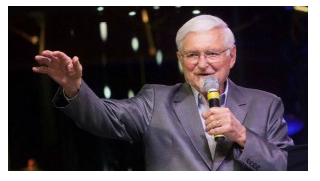 The apostles today fail to meet the biblical requirements for the apostolic office. Only someone with each and every one of the credentials above could they claim to be an apostle of Jesus Christ. Obviously there are no foundational apostles of Jesus Christ in the church today. But C. Peter Wagner readily admits that he excludes the biblical qualifications in defining an apostle. In his own words,
The apostles today fail to meet the biblical requirements for the apostolic office. Only someone with each and every one of the credentials above could they claim to be an apostle of Jesus Christ. Obviously there are no foundational apostles of Jesus Christ in the church today. But C. Peter Wagner readily admits that he excludes the biblical qualifications in defining an apostle. In his own words,
There are three biblical characteristics of apostles which some include in their definition of apostle, but which I have chosen not to include: (1) signs and wonders (2 Cor. 12:12), (2) seeing Jesus personally (1 Cor. 9:1), and (3) planting churches (1 Cor. 3:10). My reason for this is that I do not understand these three qualities to be non-negotiables. They characterize many, perhaps most, apostles. But if a given individual lacks the anointing for one or more of them, this, in my opinion, would not exclude that individual from being a legitimate apostle.
Wagner also speaks of what he designates Vertical Apostles (such as ecclesiastical apostles, functional apostles, apostolic team members and congregational apostles), Horizontal Apostles (such as convening apostles, ambassadorial apostles, mobilizing apostles. and territorial apostles) and Marketplace Apostles. Clearly these are not only extra-biblical, but unbiblical definitions for what the Scriptures say about apostles.
